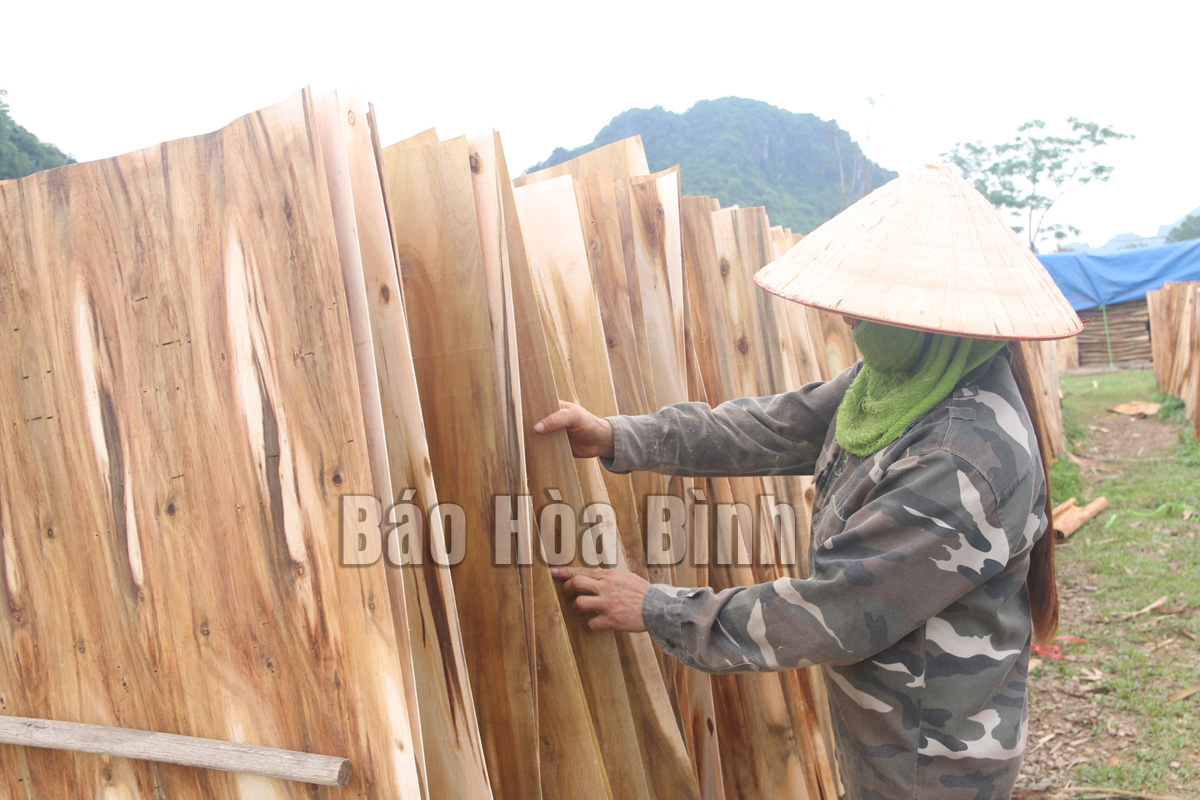
(HBO) – Over the past years, the Party Committee of An Binh commune in Lac Thuy district has paid great attention to evaluating the efficiency of models of studying and following President Ho Chi Minh's thought, morality and lifestyle, then choosing the best models to multiply and spread the movement in society.

Cho Dap hamlet of An Binh commune (Lac Thuy)
develops industrial wood peeling craft to create more jobs and ensure stable
income for local labourers.
Many good models initiated by collectives and individuals in the commune have
been seen, including those to support students from poor families, and donate
land to build flower roads and make contributions to the building of new-style
rural areas.
Particularly, Vu Thi Tham, a member of Cho Dap hamlet’s Party cell, has
developed a industrial wood peeling chain to create jobs for nearly 30 local
labourers whose incomes range from 4-7 million VND. Her family has also donated
hundreds of square metres of land for the new-style rural areas building.
Meanwhile, the commune's Party Committee and its Inspection Board have
conducted supervisions over the implementation of the Resolution of the 12th
Party Central Committee’s fourth session and the Politburo’s Directive No.05 on
studying and following President Ho Chi Minh’s thought, morality and lifestyle
in many local Party cells.
As a result, no Party member has shown signs of degradation in political
ideology, morality and lifestyle, and 100% of Party members have recorded
strong performance in implementing Party regulations and State laws, and
completed their tasks.
Dinh Minh Mao, Secretary of the commune's Party Committee, said that studying
and following President Ho Chi Minh’s Minh’s thought, morality and lifestyle
have become a regular task of each member of the Party Organisation.
However, he pointed out that the number of multiplied models in the field
remains modest. He said that the Party Committee has directed local Party cells
to show better performance in enhancing officials and Party members’ awareness
of Directive No.05, and improving their responsibility and methods of studying
and following the late leader’s example.
In the spirit of "Party members go first, the people follow”, all households of Party members in the Doan Ket sub-region in Da Bac town, Da Bac district, voluntarily removed gates and fences, and donated land when the road expansion project passed through their properties. Inspired by their example, 68 households in the sub-region quickly followed suit, contributing over 1,400 sq.m of residential and perennial cropland to widen the main road through the residential area. The exemplary role of Party members in Doan Ket stands as a shining example of studying and following President Ho Chi Minh’s thought, morality, and lifestyle.
The Hoa Binh provincial People's Committee held a monthly meeting on May 29 to assess the implementation of socio-economic development tasks in the first six months of 2025, the progress of key projects, and some other important issues.
During his lifetime, President Ho Chi Minh always expressed his deep affection and special concern for children and youth. He once emphasized: "Caring for and educating children well is the responsibility of the entire Party and the entire people”; "First of all, the family (i.e. grandparents, parents, siblings) must do this job well”. "the Party Committees…, the Children’s Committee, the Youth Union, the education sector, and all related organizations must have specific plans to ensure children grow healthier and more progressive”. His teachings has been remaining valuable and serving as the guiding principles in the work of protecting, caring for, and educating children. In line with this ideology, Hoa Binh Province has continuously been prioritizing and investing resources in the well-being of children in recent years.
Mr. Nguyen Phi Long, the alternate Member of the Party Central Committee and Secretary of the Provincial Party Committee chaired the meeting of the Standing Committee of the Provincial Party Committee to provide opinions on several investment projects within the province. There was the attendance of Ms. Bui Thi Minh, the Permanent Deputy Secretary of the Provincial Party Committee and Chairwoman of the Provincial People’s Council; Mr. Bui Đuc Hinh, the Deputy Secretary of the Provincial Party Committee and Chairman of the Provincial People’s Committee and other members of the Standing Committee; the leaders from other departments, agencies, and some localities.
The Standing Board of the Vietnam Fatherland Front (VFF) Committee of Hoa Binh province held a meeting on May 28 to honour outstanding village elders, village heads, and reputable individuals from local ethnic minority and religious communities.
In mid-May, the provincial Museum organised an exhibition named "Duoi la co Dang Cong san Viet Nam quang vinh” (Under the flag of the glorious Communist Party of Vietnam). This meaningful activity took place in the joyful atmosphere to celebrate the country's major holidays and the Party congresses at all levels for the 2025-2030 term, towards the 14th National Party Congress.



